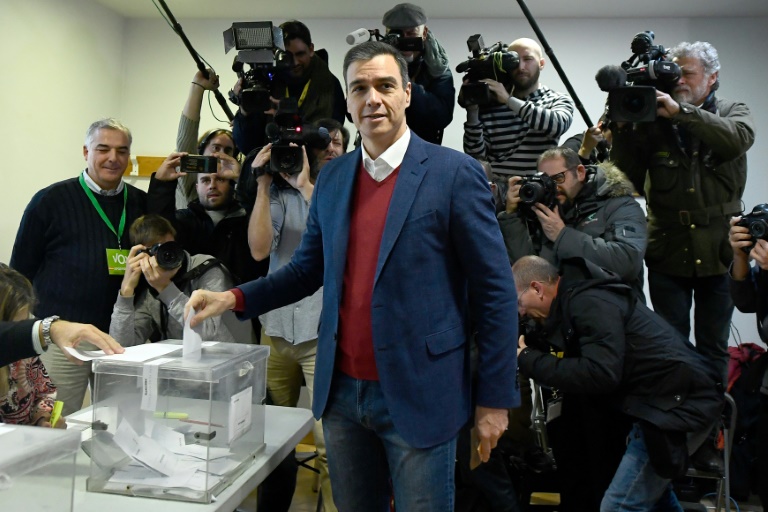
Madrid (AFP) - Spain voted Sunday in its fourth general election in as many years with heightened tensions over Catalonia's separatist push in the foreground, an issue that has fuelled a surge in support for upstart far-right party Vox.
The repeat polls were called after Prime Minister Pedro Sanchez failed to secure support from other parties following an inconclusive election in April which saw his Socialist party win the most votes, but no working majority in parliament.
Opinion polls suggest this new election will fail to break the deadlock.Neither the left nor the right look likely to win a ruling majority in Spain's 350-seat parliament.
The Socialists are on track to finish top again, but with slightly fewer seats than the 123 they picked up in April, while the main opposition conservative Popular Party (PP) could make a comeback from its worst performance ever.
But the most striking development could be the rise of the far-right Vox party, which could even jump to third-largest in parliament, according to polling.
After casting his ballot in Madrid, Sanchez urged Spaniards to head to the polls, saying "it is very important that we all participate to strengthen our democracy" and that the country "have the needed stability to be able to form a government".
The last election produced a near-record 76 percent turnout, which helped Sanchez who had mobilised left-leaning voters to oppose Vox.
But as of 6:00 pm (1700 GMT) turnout stood at 56.9 percent, nearly four percentage points lower than at the same time during the April race.
Polling stations will close at 8:00 pm, with results expected two hours later.
'Drastic solutions'
The campaign took place on the heels of a fresh wave of demonstrations in Catalonia.
Separatists have taken to the streets after Spain's Supreme Court on October 14 sentenced nine Catalan separatist leaders to lengthy jail terms over their role in a failed 2017 independence bid in protests that sometimes turned violent.
More than 600 people were injured in the demonstrations, which saw some protesters set fire to dumpsters and cars and clash with police.
PP leader Pablo Casado called during the campaign for a "real government that will put order in Catalonia".
But the toughest line against the Catalan separatists has come from Vox leader Santiago Abascal.
"Drastic solutions are needed," he said during his final campaign rally on Friday night in Madrid.
He repeated his pledge to end the Catalan crisis by suspending Catalonia's regional autonomy, banning separatist parties and arresting its regional president, Quim Torra, who has vowed to continue the secession drive.
The crowd responded by chanting "Torra to the dungeon."
Vox won 24 seats in parliament in the last election in April, in the first significant showing by a far-right faction since Spain's return to democracy following the death of dictator Francisco Franco in 1975.
'Uses falsehoods'
Polls suggest Vox, also an advocate of anti-immigration and anti-feminist policies, could double that number this time around, mirroring gains by far-right parties in other European countries such as France, Hungary and Poland.
Lidia Lopez, a 21-year-old trainee journalist, said Abascal got visibility by taking part in election debates.
"But the problem is that during such debates, he uses falsehoods and nobody checks in real-time to see if what he's saying is true or not, so people hear it and believe it is true," she said after casting her ballot for far-left party Podemos in Madrid.
In recent days, Sanchez has repeatedly raised the alarm about Vox's "aggressive ultra-rightwing" policies, warning the party would drag the country back to the dark days of Franco's dictatorship.
Spain has been caught in political paralysis since the election of December 2015 when Podemos and business-friendly Ciudadanos entered parliament.
That put an end to decades of dominance of the two main parties, the PP and the Socialists, in the eurozone's fourth-largest economy.
But there is a risk Sunday's vote will only prolong the agony.
With no single party able to secure the required 176 seats for a majority, the Socialists are likely to opt for a minority government, ING analyst Steven Trypsteen said.
"Voting intentions appear to have changed since the April election.But these changes will not make it easier to form a government," he added.







